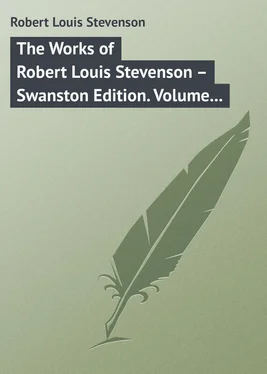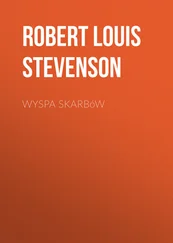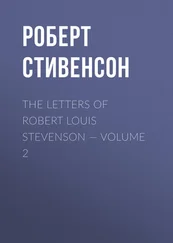Robert Stevenson - The Works of Robert Louis Stevenson – Swanston Edition. Volume 23
Здесь есть возможность читать онлайн «Robert Stevenson - The Works of Robert Louis Stevenson – Swanston Edition. Volume 23» — ознакомительный отрывок электронной книги совершенно бесплатно, а после прочтения отрывка купить полную версию. В некоторых случаях можно слушать аудио, скачать через торрент в формате fb2 и присутствует краткое содержание. ISBN: , Жанр: foreign_prose, на английском языке. Описание произведения, (предисловие) а так же отзывы посетителей доступны на портале библиотеки ЛибКат.
- Название:The Works of Robert Louis Stevenson – Swanston Edition. Volume 23
- Автор:
- Жанр:
- Год:неизвестен
- ISBN:http://www.gutenberg.org/ebooks/30894
- Рейтинг книги:3 / 5. Голосов: 1
-
Избранное:Добавить в избранное
- Отзывы:
-
Ваша оценка:
- 60
- 1
- 2
- 3
- 4
- 5
The Works of Robert Louis Stevenson – Swanston Edition. Volume 23: краткое содержание, описание и аннотация
Предлагаем к чтению аннотацию, описание, краткое содержание или предисловие (зависит от того, что написал сам автор книги «The Works of Robert Louis Stevenson – Swanston Edition. Volume 23»). Если вы не нашли необходимую информацию о книге — напишите в комментариях, мы постараемся отыскать её.
The Works of Robert Louis Stevenson – Swanston Edition. Volume 23 — читать онлайн ознакомительный отрывок
Ниже представлен текст книги, разбитый по страницам. Система сохранения места последней прочитанной страницы, позволяет с удобством читать онлайн бесплатно книгу «The Works of Robert Louis Stevenson – Swanston Edition. Volume 23», без необходимости каждый раз заново искать на чём Вы остановились. Поставьте закладку, и сможете в любой момент перейти на страницу, на которой закончили чтение.
Интервал:
Закладка:
“As to the fitting scale, then, on which to treat the memory of a man who fills five years after his death such a place as this in the general regard, and who has desired that a selection from his letters shall be made public, the word ‘selection’ has evidently to be given a pretty liberal interpretation. Readers, it must be supposed, will scarce be content without the opportunity of a fairly ample intercourse with such a man as he was accustomed to reveal himself in writing to his familiars. In choosing from among the material before me” (I still quote from the Introduction of 1899), “I have used the best discretion that I could. Stevenson’s feelings and relations throughout life were in almost all directions so warm and kindly, that very little had to be suppressed from fear of giving pain. 2 2 The point was one on which Stevenson himself felt strongly. In a letter of instructions to his wife found among his posthumous papers he writes: “It is never worth while to inflict pain upon a snail for any literary purpose; and where events may appear to be favourable to me and contrary to others, I would rather be misunderstood than cause a pang to any one whom I have known, far less whom I have loved.” Whether an editor or biographer would be justified in carrying out this principle to the full may perhaps be doubted.
On the other hand, he drew people towards him with so much confidence and affection, and met their openness with so much of his own, that an editor could not but feel the frequent risk of inviting readers to trespass too far on purely private affairs and feelings, including those of the living. This was a point upon which in his lifetime he felt strongly. That excellent critic, Mr. Walter Raleigh, has noticed, as one of the merits of Stevenson’s personal essays and accounts of travel, that few men have written more or more attractively of themselves without ever taking the public unduly into familiarity or overstepping proper bounds of reticence. Public prying into private lives, the propagation of gossip by the press, and printing of private letters during the writer’s lifetime, were things he hated. Once, indeed, he very superfluously gave himself a dangerous cold, by dancing before a bonfire in his garden at the news of a ‘society’ editor having been committed to prison; and the only approach to a difference he ever had with one of his lifelong friends arose from the publication, without permission, of one of his letters written during his first Pacific voyage.
“How far, then, must I regard his instructions about publication as authorising me to go after his death beyond the limits which he had been so careful in observing and desiring others to observe in life? How much may now fairly become public of that which had been held sacred and hitherto private among his friends? To cut out all that is strictly personal and intimate were to leave his story untold and half the charm of his character unrevealed: to put in too much were to break all bonds of that privacy which he so carefully regarded while he lived. I know not if I have at all been able to hit the mean, and to succeed in making these letters, as it has been my object to make them, present, without offence or intrusion, a just, a living, and proportionate picture of the man as far as they will yield it. There is one respect in which his own practice and principle has had to be in some degree violated, if the work was to be done at all. Except in the single case of the essay Ordered South , he would never in writing for the public adopt the invalid point of view, or invite any attention to his infirmities. ‘To me,’ he says, ‘the medicine bottles on my chimney and the blood on my handkerchief are accidents; they do not colour my view of life; and I should think myself a trifler and in bad taste if I introduced the world to these unimportant privacies.’ But from his letters to his family and friends these matters could not possibly be left out. The tale of his life, in the years when he was most of a correspondent, was in truth a tale of daily and nightly battle against weakness and physical distress and danger. To those who loved him, the incidents of this battle were communicated, sometimes gravely, sometimes laughingly. I have greatly cut down such bulletins, but could not possibly omit them altogether.”
In 1911, twelve years after the above words were written, the estimate expressed in them of Stevenson’s qualities as a writer, and of the place he seemed likely to maintain in the affections of English readers all the world over, had been amply confirmed by the lapse of time. The sale of his works kept increasing rather than diminishing. Editions kept multiplying. A new generation of readers had found life and letters, nature and human nature, touched by him at so many points with so vivifying and illuminating a charm that it had become scarcely possible to take up any newspaper or magazine and not find some reference to his work and name. Both series of letters – even one mainly concerned, as the Vailima Letters are, with matters of interest both remote and transitory – had been read in edition after edition: and readers had been and were continually asking for more. The time was thought to have come for a new and definitive edition, in which the two series of letters already published should be thrown into one, and as much new material added as could be found suitable. The task of carrying out this scheme fell again upon me. The new edition constituted in effect a nearly complete epistolary autobiography. It contained not less than a hundred and fifty of Stevenson’s letters hitherto unpublished. They dated from all periods of his life, those written in the brilliant and troubled days of his youth predominating, and giving a picture, perhaps unique in its kind, of a character and talent in the making. The present edition is a reprint of the edition of 1911, with a few errors of transcription and one or two of date corrected, and with a very few new letters added.
Much, of course, remains and ought to remain unprinted. Some of the outpourings of the early time are too sacred and intimate for publicity. Many of the letters of his maturer years are dry business letters of no general interest: many others are mere scraps tossed in jest to his familiars and full of catchwords and code-words current in their talk but meaningless to outsiders. Above all, many have to be omitted because they deal with the intimate affairs of private persons. Stevenson has been sometimes called an egoist, as though he had been one in the practical sense as well as in the sense of taking a lively interest in his own moods and doings. Nothing can be more untrue. The letters printed in these volumes are indeed for the most part about himself: but it was of himself that his correspondents of all things most cared to hear. If the letters concerned with the private affairs of other people could be printed, as of course they cannot, the balance would come more than even. We should see him throwing himself with sympathetic ardour and without thought of self into the cares and interests of his correspondents, and should learn to recognise him as having been truly the helper in many a relation where he might naturally have been taken for the person helped.
As to the form in which the Letters are now presented, they fill three volumes instead of the four of the 1911 edition, the division into fourteen sections according to date being retained. As to the text, it is faithful to the original except in so far as I have freely used the editorial privilege of omission when I thought it desirable, and as I have not felt myself bound to reproduce slips and oddities, however characteristic, of spelling. In formal matters like the use of quote-marks, italics, and so forth, I have adopted a more uniform practice than his, which was very casual and variable.
Читать дальшеИнтервал:
Закладка:
Похожие книги на «The Works of Robert Louis Stevenson – Swanston Edition. Volume 23»
Представляем Вашему вниманию похожие книги на «The Works of Robert Louis Stevenson – Swanston Edition. Volume 23» списком для выбора. Мы отобрали схожую по названию и смыслу литературу в надежде предоставить читателям больше вариантов отыскать новые, интересные, ещё непрочитанные произведения.
Обсуждение, отзывы о книге «The Works of Robert Louis Stevenson – Swanston Edition. Volume 23» и просто собственные мнения читателей. Оставьте ваши комментарии, напишите, что Вы думаете о произведении, его смысле или главных героях. Укажите что конкретно понравилось, а что нет, и почему Вы так считаете.










